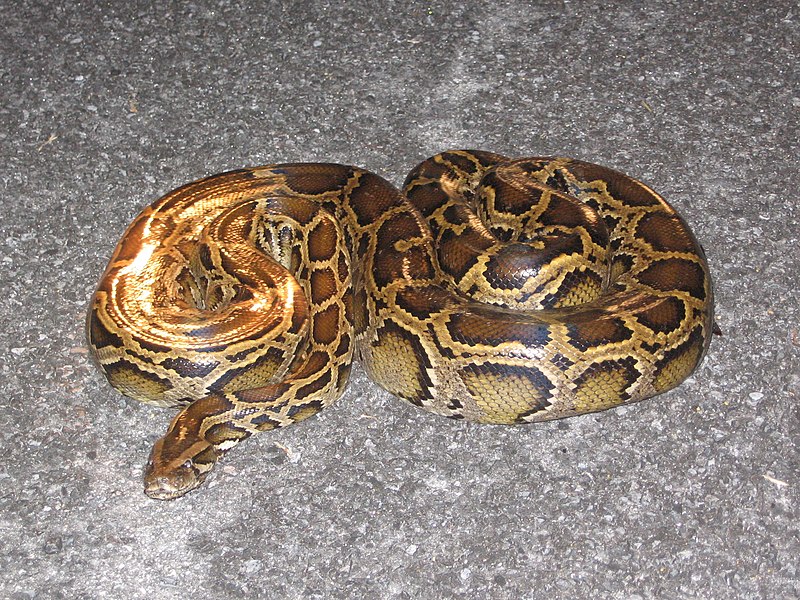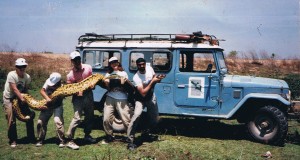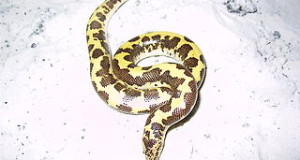 A recent article in the journal IRCF Reptiles and Amphibians (V17, 1) provides evidence that the African Rock Python (Northern African Python, Python sebae), may have established a breeding population in southern Florida. The huge constrictors are adapted to take small antelopes and other large animals, and have been killed and consumed people in their native habitat.
A recent article in the journal IRCF Reptiles and Amphibians (V17, 1) provides evidence that the African Rock Python (Northern African Python, Python sebae), may have established a breeding population in southern Florida. The huge constrictors are adapted to take small antelopes and other large animals, and have been killed and consumed people in their native habitat.
Florida’s Introduced Constrictors
At least 45 species of non-native reptiles and amphibians have established breeding populations in Florida; many others have been observed but are not known to be reproducing. Among these are 2 of the world’s largest snakes, the Burmese Python and the Boa Constrictor. Other large constrictors, including the Green Anaconda, Yellow Anaconda and White-Lipped Python, have been found at large in Florida.
Anacondas and others Established?
Given the extent of Florida’s wetlands and other densely-vegetated habitats, it is not unlikely that reproduction of other species has occurred unseen. Anacondas, being aquatic, are especially difficult to find. Years ago, I was told by a reliable source that an entire litter of Green Anacondas escaped from a roadside zoo near Florida City in the early 1970’s…nothing would surprise me at this point!
Northern African Python Study
The article mentioned above looked at Northern African Python sightings and captures in south Florida from 2002-2009. In that period, 7 individuals were found in a small (less than 10 square miles) area in Dade County. Among the captured snakes was an 15.5 foot-long adult female with eggs forming in the oviduct, reproductively active males, and several young-of-the-year. The ages and sexes of these snakes, and their proximity to one another, suggests a breeding population.
Also notable is the fact that the capture sites were less than 1 mile from the border of the Everglades, an immense habitat that could easily hide other African Rock Pythons.
Recent meals – a Domestic Turkey and a Boat-tailed Grackle – were recovered from 2 of the snakes.
Python Hybrids
 The African Rock Pythons were found in an area that abuts or overlaps with the range of Florida’s introduced Burmese Pythons. The 2 species will mate with one another in captivity; the fertility of the resulting hybrids, and their possible affect on south Florida ecosystems, bears further study.
The African Rock Pythons were found in an area that abuts or overlaps with the range of Florida’s introduced Burmese Pythons. The 2 species will mate with one another in captivity; the fertility of the resulting hybrids, and their possible affect on south Florida ecosystems, bears further study.
Further Reading
The African Rock Python in Florida (National Geographic)
Video: Rock Python found in Florida
News Article, Photo: African Rock Python Captured in Florida
Study: Burmese Python Winter Tolerance
Python Sebae image referenced from wikipedia and originally posted by Brian.Gratwicke
 That Reptile Blog – Reptile, Amphibian and Exotic Pet Care and Information
That Reptile Blog – Reptile, Amphibian and Exotic Pet Care and Information



Well,how far north can these suckers be a threat?
Hello, Frank Indiviglio here.
Thanks for your interest in our blog…a good and timely question. There are no studies directly on point. Those found in Fla seem to be from the northern part of their natural range. This is fairly close to the equator, and so they are not known or expected to have the same degree of cold tolerance as do Burmese Pythons (which in their natural habitat get into some near-temperate areas). This study established that Burmese Pythons cannot tolerate a typical winter in South Carolina. We can infer that the same would be true of African Rock Pythons, at least those originating in the north of their range.
Southern populations are established further from the equator, and may have a greater cold tolerance, but I’m not aware of any studies.
Please let me know if you need any further information. Good luck, enjoy and please keep me posted.
Best regards, Frank Indiviglio.
hi just wanted to know what the state is going to about it are they going to allow hunting these snakes
Hello Travis, Frank Indiviglio here.
Thanks for your interest in our blog. African Rock Pythons may be hunted in Fla. by holders of a Python Removal Permit. Please check here (Florida Fish and Game) for more info on obtaining a permit, the species that may be taken, and other regulations.
Please let me know if you need any further information and please keep me posted.
Best regards, Frank Indiviglio.
these r beautiful snakes. why would u want to hunt them. are thay going to stop?
Hello Briana, Frank Indiviglio here.
Thanks for your interest. I agree; unfortunately animals and plants that become established in foreign habitats (areas where they are not native) invariably cause problems, usually severe, for native species. In the case of African Rock Pythons, people may be negatively affected as well. Florida is home to over 100 non-native reptiles and amphibians, along with as many or more plants, fishes, birds and invertebrates, most of which are now too well-established to be eliminated.
Please let me know if you need any further information. Good luck, enjoy and please keep me posted.
Best regards, Frank Indiviglio.